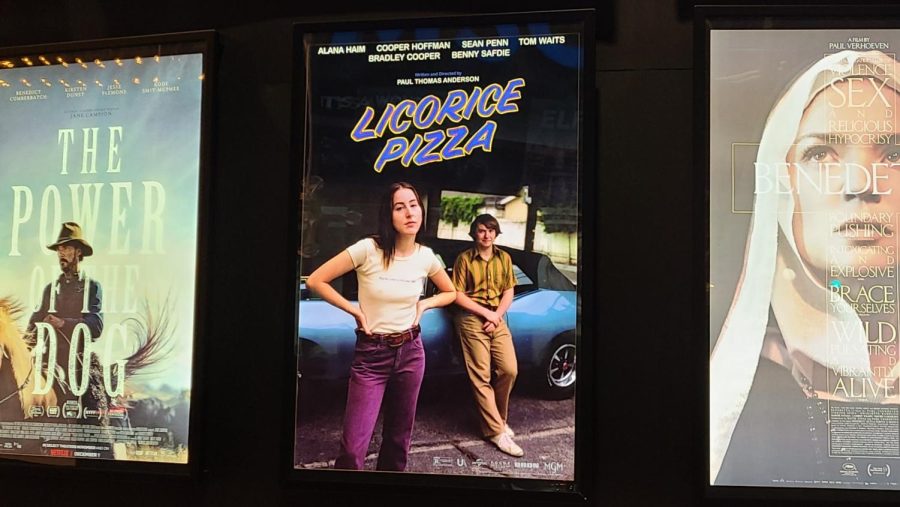‘Licorice Pizza’ review: a 1970s slice of life
Paul Thomas Anderson uses his new film to take audiences back to the Hollywood of his childhood.
Paul Thomas Anderson’s “Licorice Pizza” has drawn many comparisons with Quentin Tarantino’s “Once Upon a Time in Hollywood”. Both films offer fictionalized tellings of the Hollywood their respective directors remember from the nostalgia of their childhood. But while the vision of L.A. Tarantino envisions is one of heroes and violence, PTA’s film harkens to a time when Hollywood and America seemed to be stuck in their own sort of identity crisis. Everyone in this film can somewhat tell that the future is garbage, but the specific kind of garbage is still up in the air. This creates the perfect atmosphere for our two leads, Alana Kane (Alana Haim) and Gary Valentine (Cooper Hoffman). In this twisted 1970s, the laws of time have less weight put on them. Alana is a 25-year-old so lost she’ll be any age she has to, and Gary is a 15-year-old desperately trying to prove otherwise.
“Licorice Pizza is a film with the freedom to exist at its own pace, free from the restrictions of a story. Yes, the film has conflict, but each thematic problem within the film derives from the characters. The film is driven by the characters from the very first scene, where an unabashedly charismatic Gary asks Alana out to dinner simply because he likes her, and hey, what’s the harm? Alana takes him up on the offer, and they both seem to play along with the schtick just to have someone seriously pay attention to them for once. Most important to Alana and Gary’s relationship is how much fun they have with each other. Other characters fill important roles within their lives, but we can see from the writing and filmmaking that in one another’s presence, everything else is tuned out.
The only scenes in which Alana ignores Gary or vice versa, one is trying to gain the attention or jealousy of the other. Immaturity like this is present in their relationship, and “Licorice Pizza” could very easily be described as a coming-of-age romance. We see both Alana and Gary attempt to grow past this immaturity, sometimes literally falling on their faces in the process. However, the other is always there to catch them, and it becomes apparent that amidst all the role-playing and false personas of Hollywood, they only have each other.
Gary starts three separate small businesses throughout “Licorice Pizza” with Alana often joining as his business partner. None of the businesses have particularly lengthy prospects, but they all serve to bring Alana and Gary closer together. His savvy fearlessness of the world feeds into Alana’s inner dreams, and they both offer each other hope that they can improve their own future.
Gary is played by Cooper Hoffman, son of the late Phillip Seymore Hoffman, who worked closely with PTA on many of his earlier films. As impressive and emotionally charged as the younger Hoffman’s debut is, Alana Haim’s might exceed it. Haim manages to capture every emotion related to growing up, and her general apathy towards the world while showing warmth to her loved ones is refreshing. Outside the unknown leads, there are big names aplenty throughout the film. Sean Penn, John C Reiley, Bradley Cooper, Tom Waits, Maya Rudolph, and George Dicaprio all make cameos of varying sizes. The sheer randomness of the appearances very much helps add to the feeling of aimlessly wandering through 70s Hollywood.
At first glance, the ending of “Licorice Pizza” appears to resemble the triumphant ending of many romantic comedies. Gary stands up in front of his thriving business on opening night and loudly declares, “May I introduce Alana Valentine!” But “Licorice Pizza” isn’t just any movie Alana looks up and rolls her eyes at Gary, because absolutely no one is paying attention to him. The relationship between Alana and Gary is special and for them alone. They go together like licorice and pizza, even if no one else understands it.
Your donation will support the student journalists of West High School. Your contribution will allow us to purchase Scholarship Yearbooks, newsroom equipment and cover our annual website hosting costs.

(he/him) Jack is the online copy editor & arts editor for WSS. He's a senior at west and is also involved in the west high Orchestra as a cellist....



